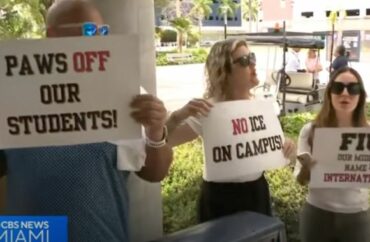
Students and faculty protest partnership, express fears about deportation
Police departments at 11 Florida universities have partnered with President Donald Trump’s administration to help enforce immigration laws on campus.
Immigration and Customs Enforcement has signed agreements with Florida International University, University of North Florida, Tallahassee State College, Florida A&M University, Florida Atlantic University, Florida Gulf Coast University, New College of Florida, University of Central Florida, University of Florida, University of South Florida, and University of West Florida, the Miami Herald reported Friday.
The agreements give campus police the authority to stop and question individuals about their legal status during their routine duties, as well as share information with ICE.
However, the officers must be trained by ICE to interrogate individuals suspected of being in the country unlawfully.
Each university police department chief will decide how many officers to enroll in the training, which consists of a 40-hour online course, according to the Miami Herald.
Gov. Ron DeSantis had ordered “Florida law enforcement to enter into additional Memoranda of Agreement” with ICE “to execute functions of immigration enforcement within the state,” according to a February news release.
“By allowing our state agents and law enforcement officers to be trained and approved by ICE, Florida will now have more enforcement personnel deputized to assist federal partners. That means deportations can be carried out more efficiently, making our communities safer as illegal aliens are removed,” DeSantis stated.
Students across Florida universities have organized demonstrations and spoken out against the partnership.
Students at FIU, for example, organized a protest this month, stating, “ICE is not welcome on our campus,” the Miami Herald reported.
Professors also participated in the protest, where members of the Union Faculty of Florida chapter held signs “opposing the ICE agreement,” according to The Guardian.
“Things are very uncertain, and there is a lot of fear, just because of the fact that FIU is an international university,” said the president of the school’s Students for Justice in Palestine chapter, Bayan Abedulazis.
Many students “are directly coming from out of the country, and they’ve just kind of detached from a lot of these spaces, like SJP or the like, because they don’t want to be caught or have risk for themselves or their families,” he said.
The agreement “effectively makes the police force a wing of Ice itself,” said Stephen Sykes, the chair of the UF Young Democratic Socialists of America chapter.
He said that student activists at UF generally saw campus police officers as “good people,” but “[n]ow a lot of that trust is definitely gone.”
“Students are scared to come out now, because to even speak up is to risk deportation,” he said.
On the other hand, the chair of FIU’s board of trustees, Rogelio Tovar, spoke out in defense of the agreement with ICE during a board meeting this month.
“No student should be fearful if they’re here legally and they’re in compliance with the law,” he said.
FIU police chief Alexander Casas also defended the decision, saying he wants his officers, rather than ICE officials, to be interacting with students, the Miami Herald reported.
“I can’t control what ICE does. But if I don’t enter the agreement, I don’t have the opportunity to say, ‘call us first, let us deal with our community,’” he said.
MORE: Universities urged to ‘support non-citizen students’
IMAGE CAPTION AND CREDIT: FIU faculty hold signs to protest ICE agreement; CBS Miami/Youtube
Like The College Fix on Facebook / Follow us on Twitter






Please join the conversation about our stories on Facebook, Twitter, Instagram, Reddit, MeWe, Rumble, Gab, Minds and Gettr.